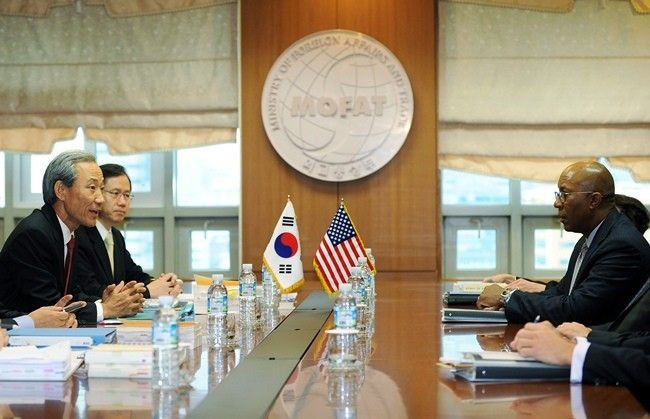US-South Korea FTA: Whose win is it anyway?

The renegotiated free trade deal between the U.S. and South Korea was approved by both sides over the weekend, and President Barack Obama said the new deal was a triumph for American workers and that it would support at least 70,000 jobs in the U.S.
While The Washington Post said the deal, which has stalled for more than three years, was a victory for the president, the South Korean media and the opposition were not kind to President Lee-Myung-Bak.
The South Korean media strongly criticized the deal, alleging that the administration caved in to U.S. pressures. Trade Minister Kim Jong-hoon took great pains to prove Seoul didn't budge under pressure, saying that he would quit and serve in the military if it was proved that he did his job incorrectly.
During the negotiations (with the U.S.), I did not think of Yeonpyeong Island or the USS George Washington. I have just mulled over the benefits and losses in terms of trade, he said, apparently to refute criticism that Seoul gave away ground to the U.S. in the aftermath of the geopolitical crisis precipitated by last week’s shelling by North Korea on South’s islands.
While announcing the deal, President Lee also stressed the importance of the U.S.-South Korea alliance.
The South Korea-US Free Trade Agreement (FTA) will bring a huge benefit to both countries. It will also provide a momentum to raise the South Korea-US alliance to a new level, he said.
Newspapers highlighted the fact that South Korea ceded ground on long-standing issues of contention, especially tariffs in the auto sector. Seoul agreed to the U.S. demands including delaying tariff eliminations and adding a safeguard to limit an unexpected rise in Korean imports. It, however, got concessions related to rules on importing pork, medicines and over work visas.
In the current tense climate on the peninsula, suspicions arose that concessions Kim made could have had something to do with strengthening the alliance between Korea and the U.S. in the wake of the North Korean shelling of the border island of Yeongpyeong last month, read a Korea Times article.
The author, Kim Tae-gyu, said though he didn’t want to believe the allegations, he was sure that the Trade Minister gave up too much for almost nothing.
Korea accepted almost every demand of the U.S. Trade Representative as far as the auto segment was concerned -- tariffs, regulations and quotas, he wrote.
The main opposition Democratic Party said the deal epitomized Seoul’s “humiliating diplomacy” and called on the government to scrap the deal. Party chairman Sohn Hak-kyu said the president should apologize.
“The results of the FTA renegotiation, in which Seoul gave in to U.S. demands, damaged the two countries’ alliance.”
As per the renegotiated deal, the U.S. will have to lift a 2.5 percent tariff on Korean cars in only five years, instead of eliminating them immediately. Also, each U.S. carmaker will be able to export 25,000 cars to South Korea. While Seoul will eliminate its tariff on U.S. trucks immediately, a U.S. tariff on Korean trucks would be phased out.
The FTA deal will need to be ratified by the Congress to come into force, but with overwhelming Republican Prty support, it looks set for a smooth sail.
However, the FTA still continued to draw criticism within the U.S. on the broader ground that free trade agreements have historically impacted U.S. jobs negatively.
Why the administration would consider moving another NAFTA-style trade deal is inexplicable, especially given that export growth under past U.S. free trade agreements was less than half of that to the rest of U.S. trade partners, Public Citizen, a Washington, D.C.-based nonprofit public interest organization, said in a release.
The organization pointed out that Bush-era International Trade Commission studies showed the Korea deal will increase America's trade deficit. It argues that Americans across diverse demographics are united in opposition to more-of-the-same trade policy.
It also accused Obama of backtracking on his campaign promise of new trade policies that will support job growth. Choosing to advance Bush's NAFTA-style Korea free trade agreement rather than the new trade policy President Obama promised during his campaign will mean more American job loss and puts the White House at odds with the majority of Americans who, polling shows, oppose more-of-the-same job-offshoring agreements.
Merely tweaking the cars and cows market access provisions of Bush's NAFTA-style Korea trade pact but leaving in place the offshoring-promoting foreign investor protections is a slap in the face to the majority of Americans who, according to repeated polls, oppose the same old trade policy that has cost millions of American jobs, Public Citizen said.
© Copyright IBTimes 2024. All rights reserved.





















